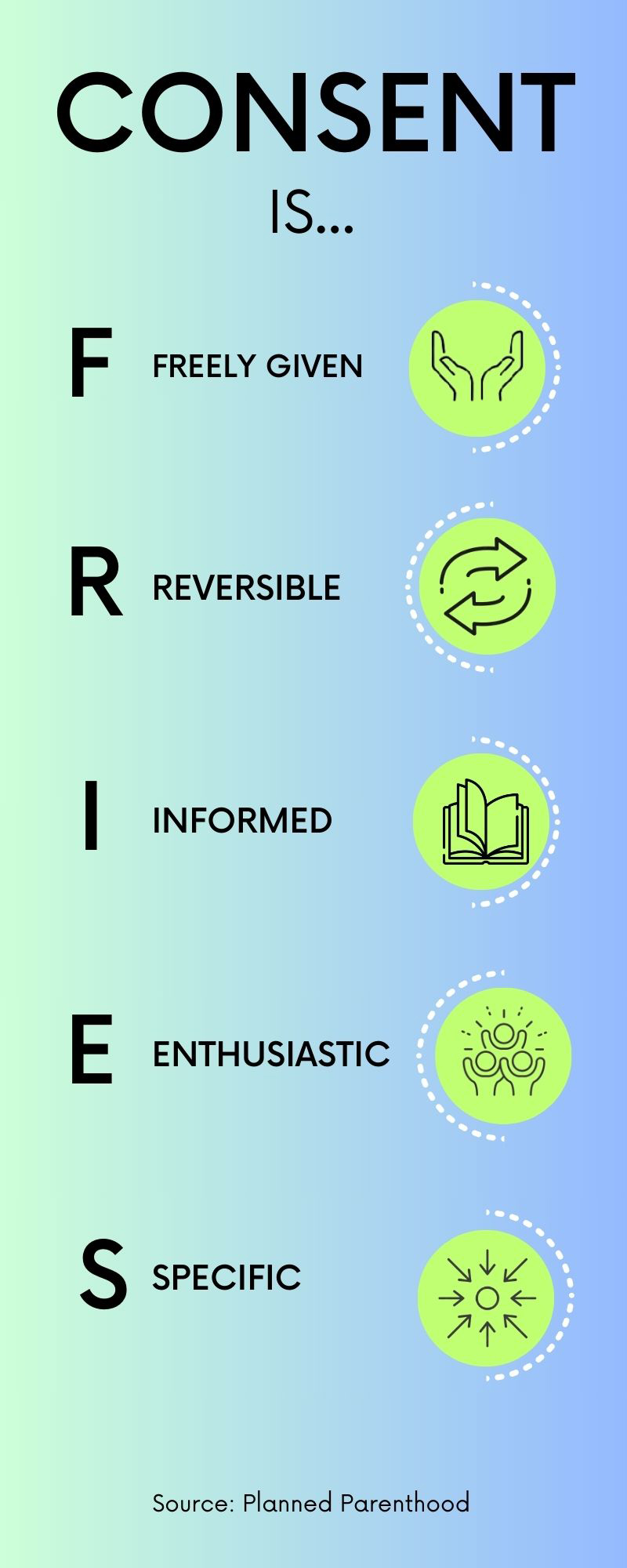An acynom by Planned Parenthood that is often used to help teach consent. Graphic by Angie Wiebe.
Consent is a topic often talked about and addressed but not many people actually understand what consent is. Consent has a general definition of permission for something to happen or an agreement to something. According to an article published by Canadian Women’s Foundation in 2022, 55 per cent of Canadians do not fully understand consent in the case of sexual activity. That means 45 per cent of Canadians know what consent is, which is less then half of Canada’s population. Consent doesn’t just apply to sexual activity, it’s also part of regular everyday life. It can be seen from a young age with something as simple as saying no to a hug from a relative, or asking before borrowing something someone else owns as well as permission for sex. Miranda Hargreaves is the system navigation and education specialist at Chinook Sexual Assault Centre (CSAC) and she says consent should be taught from a young age.
“I think it’s really important to have those ongoing conversations really early,” says Hargreaves.
Sexual education is a mandatory part of Alberta’s school curriculum from Grade 4 to Grade 9. In grades 10 through 12, sexual education is no longer mandatory but can be implemented into classes. Consent as a topic became mandatory for younger children as of April 2022. Schools can hire someone to come in and discuss sexual education and topics like consent. CSAC in Lethbridge is one of those businesses who runs programs and can come into classes to teach these subjects. They can work with high schools, middle schools and post secondary schools to discuss age appropriate topics and create awareness of subjects relating to consent and sexual education.
Consent isn’t just a one time agreement or permission. Someone can change their mind about consent at anytime. Consent has to be ongoing and positive according to Canadian law. An acronym, FRIES, created by Planned Parenthood stands for freely given, reversible, informed, enthusiastic and specific. These are all things consent should be. Carmen Guenther, manager of Wellness Services at Lethbridge College, says being enthusiastic is always an important part of consent.
“It should be without question that everyone is good to go, if you are doubting something, it’s time to stop,” says Guenther.
The topic of consent is often discussed in sexual settings between people. Sexual assault can happen when that consent is ignored by one of the members. In many relationships some people may feel weird asking for consent, but it is always important to make sure and have those conversations.
“It can be shown as respect to a partner to ask is this okay, can I kiss you, can I do this,” says Hargreaves.
Pressuring someone or convincing someone to have sex counts as sexual assault. Getting consent by coercion is not actually consent. Steps must be taken to ensure consent and make sure it is ongoing throughout. Sex is where most people think about the idea of consent as it is so important, but it can also apply to many other places.
“When we take it out of sex, it actually feels like a more relatable conversation,” says Guenther.
She says it is important to be talking about consent. Awareness of consent has gone up 33 per cent since 2015 according to the Canadian Women’s Foundation. There is always more work being done by places such as the college’s Wellness Centre, CSAC and other organizations to help make sure the topic of consent and other sexual education is being taught to everyone.
The topic of consent can be difficult to talk about and hear. If you need any support Wellness Services always has someone you can speak to by calling 403-320-3289, send them an email at wellness.services@lethbridgecollege.ca or visit them in CE1380. CSAC is there to help by calling 403-694-1094 and the program REES has been brought into Lethbridge College so you can share you story anonymously with them and talk about it on their website, reescommunity.com.



